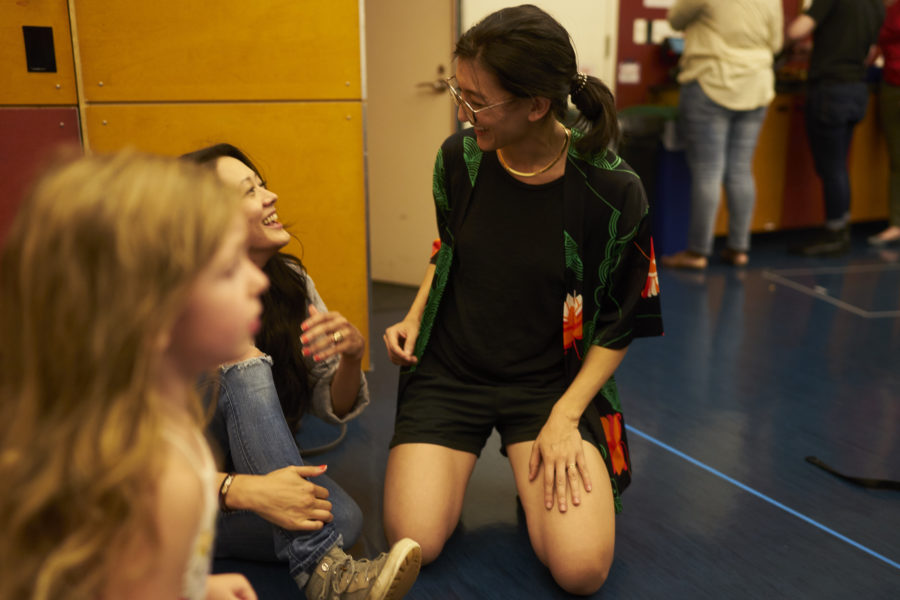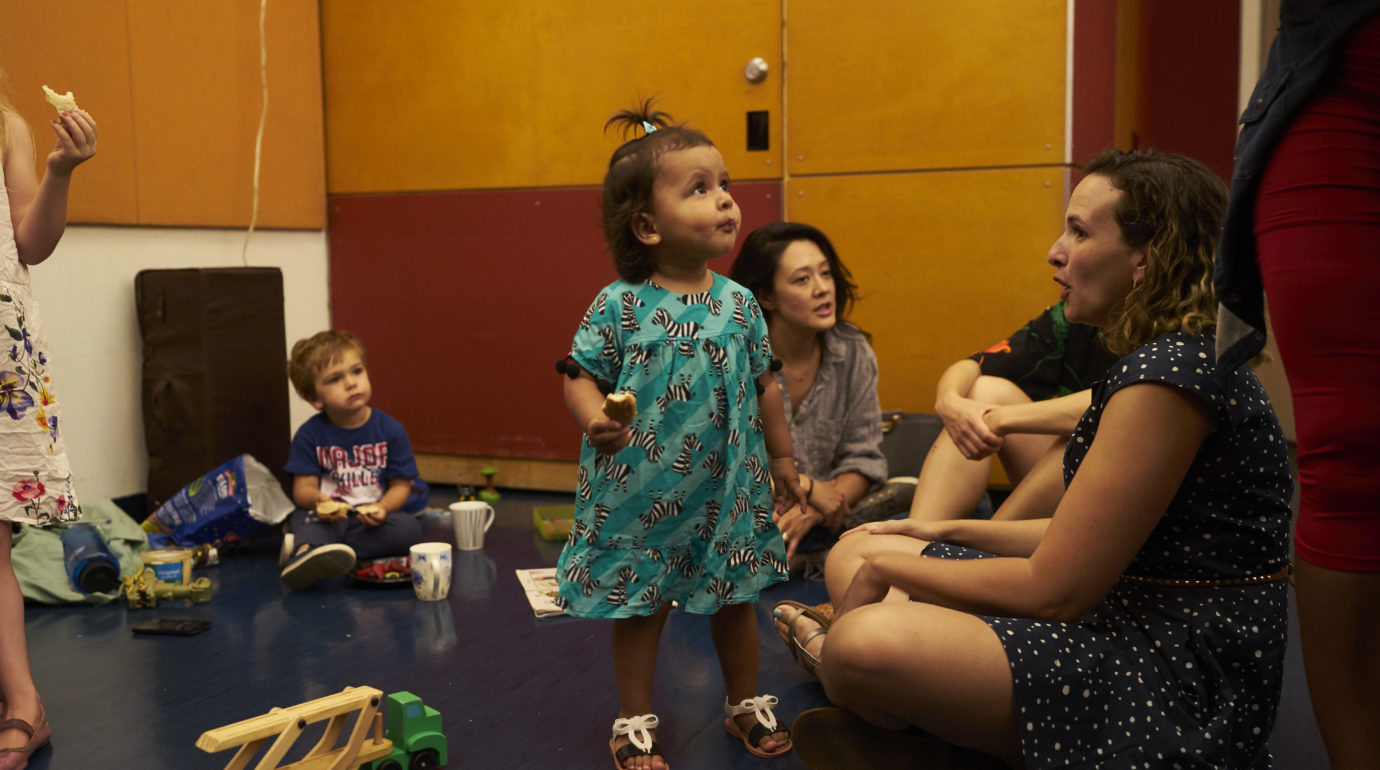Back in August, the first day of rehearsal for Anna Moench’s play Mothers at the Playwrights Realm, two things happened that don’t usually happen on such days. First, the employees voted to determine their own schedule going forward. And then everyone introduced themselves in a detailed and personal way.
In a majority vote, rehearsals were set to run 10 a.m. to 4 p.m., five days a week for four weeks. Next, director Robert Ross Parker had each person state their name, pronouns, and role in the show. Roberta Maia Pereira introduced herself as the theatre’s producing director, then gestured to the two-year-old in her arms. “This is Bianca,” Pereira said happily. “She can sign your check. She/her/hers for me; for Bianca, I don’t know yet. We’ll know in a few years.” Bianca adorably recited her own name, followed by two other children who were along for the rehearsal ride.
Flexible scheduling and child cameos are byproducts of the Off-Broadway company’s new Radical Parent-Inclusion Project (RPI), which aims to make the rehearsal and production process more supportive for parents and caregivers. The main feature of the initiative is a push to actively hire parent artists, and to provide free childcare for actors at auditions. Fittingly, the program is being piloted for the production of Mothers, a dark comedy in which upper-middle-class parents at a mommy-baby meetup group vie for validation and survival.
Rehearsal that morning embraced a truism that encompasses parenting overall: not knowing. Not knowing when one would be interrupted by an excited outburst from waddling toddlers, but being open to moving forward. Not knowing when juice might be spilled, but being ready with napkins if it did happen. And not knowing when something might come up with a family member that required putting the work on hold, but being willing to adapt.
Pereira, who became a solo mother to Bianca by choice two years ago, saw Mothers as the perfect springboard for RPI. “Theatre’s such a difficult field, but actually adding being a parent, it honestly becomes almost impossible,” she remarked. the U.S. is the only developed country that does not provide paid parental leave, and for artist-parents, many would-be opportunities are rendered untenable. When childcare costs more than the money you’re making from doing a show, is the show really worth it?
Not to mention, by virtue of biology and culture, parenthood “affects women more than men,” said Pereira. “It affects women of color more than anybody else, so for me really this is an issue of equity. And so it’s absolutely is aligned with our values to see how we can support parents in the arts.” And in an industry like theatre, where women are already underrepresented in many leadership roles, those who choose to become mothers face a double disadvantage.
Pereira is navigating RPI with the help of her grad school classmate, Rachel Spencer Hewitt, founder of the Parent Artist Advocacy League for the Performing Arts (PAAL), which provides ideas for theatres about how to improve the work environment for parents. During that first Mothers rehearsal, Hewitt introduced herself as a resource for everyone, even those who wished to vent about the annoyances that come with having children present during rehearsals.
Moench, who had her son while still a graduate student, found inspiration for Mothers during a sleepless night breastfeeding her newborn. She stumbled upon an article about a woman in Myanmar whose own infant son had been pried from her hands and thrown in a fire during the Rohingya genocide. “It really made me think in a global sense about what it is like to be a mother and what that relationship is like amidst chaos and upheaval, and how global and interpersonal politics affect women and children,” Moench explained. Mothers is set in a nondescript suburban town, but unsettling sounds and references to terrorist organizations belie the true state of disorder that exist outside the walls of Mommy & Me.
In Moench’s play, it’s every mother, father, and caregiver for themselves. Passive-aggressive comments about child, spouse, and career satisfaction fuel most of the first act. Many of the characters are based, Moench said, on “the women I met at these mommy daycares and the ways that we are so focused on our fears. These primal fears and this primal love manifests in, like, which preschool do you think that they will go to? Are they meeting these milestones on time? Is your pediatrician the best one? All of these things that are so silly and petty and small, but at the same time, because you care so deeply about your child, they are magnified so much to you.”

By contrast, during rehearsals for Mothers, the dialogue is a lot more cordial and empathetic. Pereira recently rearranged the rehearsal schedule for a cast member dealing with a family emergency. The Realm is also providing Moench’s family with housing in New York City, since they live in Los Angeles. If it were any other company producing, Moench said, “I would have had to leave my family in California to come do this play. My son is two-and-a-half, and it’s not easy for me to explain to him what a play is or how long rehearsals are or why I’m gone for two months.” Luckily, while in NYC, Moench’s husband is taking care of their son while she’s at rehearsal.
Pereira acknowledges that to fund RPI, the Realm had to turn to multiple donors, including the Howard Gilman Foundation, the James S. & Meryl H. Tisch Fund, Lynn & Stephan Solomon, and the Venturous Theater Fund of the Tides Foundation. “I’m not suggesting that every theatre should raise extra money to do all of these things,” she admitted. “But I want this to serve as a model to the field—through artists, conference presentations—and be very transparent about it.”
As part of RPI, a special matinee production of Mothers will provide free childcare for audience members (whose kids will take part in a musical singalong class). The Realm is also providing caretaking stipends: One Mothers team member is using it to cover childcare the week before his daughter goes back to school, when his co-parent is starting work. Because, as Pereira emphasized, caretaking is not just about parenting. “There are some people that are responsible for an elderly parent, for example, so that’s something we also are aware of and responsive for.”
Though the word “radical” is in its name, the artists at the Realm are hoping that soon such initiatives will be commonplace and will help lead to an industry more hospitable to working caregivers—one in which artists aren’t afraid to speak up for their personal needs. “I’m hoping [RPI] is creating a safe space for people to be able to share all the pieces around them—the pieces that are caretaker, and the pieces that are an artist, because they all complement each other,” said Pereira.
Claire Chang is an alumnus of the National Theatre Institute completing a bachelors of creative writing at Hamilton College.


